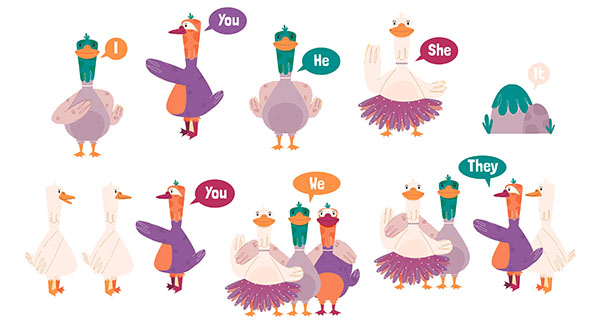Personal Pronouns with Examples

Table of Contents
What are Personal Pronouns?
Personal pronouns are used to replace a specific person’s name. A personal pronoun in the subjective case indicates that it is acting as the subject of the verb. They are referred to as subjective pronouns when they act as the subject of a sentence, that is, when they perform the action of the verb.
The personal pronouns in the English language are:
“I,” “you,” “she,” “he,” “it,” “we,” “you,” “they,” and “who.” These pronouns, also called subjective or subject personal pronoun, are used as substitute for proper and common nouns.
Examples of Personal Pronouns
- Erin is a teacher.
- She is a teacher. ( She replaces the proper noun Erin)
- Tim and Tina are on the same volleyball team.
- They are on the same volleyball team. (They replaces the proper nouns Tim and Tina)
- Mr. Smith just bought a new car.
- He just bought a new car. ("He" replaces the proper nouns Mr. Smith.)
- You and I can share a pizza if it’s big enough.
- We can share a pizza if it’s big enough. (We replaces the nouns "you" and "I")
- The book is on the desk.
- It is on the desk. ("It" replaces the common noun book)
- The grocery stores are not open on the holiday.
- They are not open on the holiday. ( They replaces the common noun grocery stores)
Personal Pronouns as Subjects
The main thing to remember is that these pronouns act as the subject of a sentence. In other words, they perform the action of the verb in the sentence. Consider the following examples:
- He ate the entire pizza. (He is the subject of the verb ate.)
- We ran over four miles today. (We is the subject of the verb ran.)
- He spends his time at the skate park. (He is the subject of the verb spends.)
- After dinner, we went to the movies. (We is the subject of the verb went.)
- They decided to travel to Greece for vacation this summer. (They is the subject of the verb decided.)
- It was a busy day yesterday at work. (It is the subject of the verb was.)
- She spent her entire paycheck on bills. (She is the subject of the verb spent.)
Ways to Use Second Person (You) Plural
Unlike many other languages, English does not have a separate word for the plural second person pronoun (you). In other words, if I am talking to one person, I would refer to them as “you,” but I also use “you” to talk to a group of people.
This can be confusing, since it does not specify if it is one person or many. Consider the following:
- Speaking to one person: “How are you today?”
- Speaking to a group of people: “How are you today?”
As a result, today many English speakers will add a word or slightly change “you” to make it mean a group of people. They may say you all, y’all, you guys, you folks, you lot, yous(e), you-uns, or any number of regional versions, which are not grammatically necessary (since the correct pronoun is simply “you”) but can clarify meaning.
Consider the following:
- Speaking to a group of people: “How are you all today?”
What if the Person’s Gender is Unknown?
Have you ever had to guess if you should refer to someone as “she” or “he” because you didn’t have enough information about them? For example, if someone tells you, “I went to see Dr. Smith this morning because I was feeling ill,” you don’t know if you should reply, “What did she say?” or “What did he say?”
You can write it out like this: he/she, he or she, (s)he, or s/he. However, this can become complicated.
Fortunately, there is another simple solution in the English language. Instead of guessing which personal pronoun to use, it is increasingly common to use the third person (“they”) when someone’s gender is not known. It is also used when gender is not really important to the information in the sentence or conversation. Some people even prefer this as their own pronoun.
Here are a few examples:
- I see that my teacher next year is listed as H. Anderson. I hope they are a good teacher!
- My friend recommended her dentist, Dr. Sandoval. I will make an appointment to see them next week.
- Whoever is the next prime minister, I hope they do something to stop the pandemic!